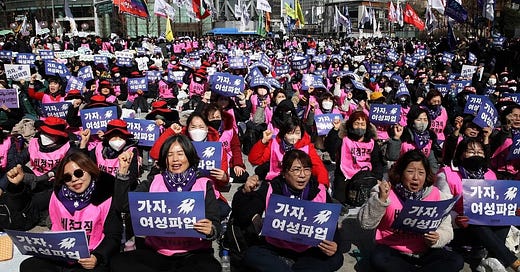South Korean sexism birthed the 4B movement
Is this boycott of men and childbirth heading West?
BY ANGELA MYERS
Women everywhere are fed up with the patriarchy, but is it time to boycott men? For a group of women in South Korea, the answer is yes. Korea’s 4B feminist movement is made up of women who have sworn off sex, child-rearing, and heterosexual relationships overall.
Given the country’s 31% gender pay gap, high rate of femicide, and impossible beauty standards, it’s easy to see why Korean women are upset. Throw in that they’re being blamed for the country’s low birth rate, and the movement — directed against rampant misogyny — makes total sense.
The 4B movement centers around Korean women in their 20s and 30s, but it’s part of a much longer legacy and one all women can be a part of, regardless of age or nationality. Here’s how the 4B movement has been influenced by — and can influence — women in their 40s and 50s.
Bihon: no marriage
Bisekseu: no sex with men
Bichulsan: no child-rearing
Beonae: no dating men
The movement started in 2019, though it’s difficult to pin an exact start date or a membership count since 4B is decentralized, in part for the protection of its members. Women in the movement seem to have ways to contact one another, but they remain anonymous to those outside the movement.
4B movement origins
4B isn’t isolated. It’s part of a larger fight for equality in South Korea and worldwide. Blackstone mentions that this group is similar to the earlier “Escape the Corset” movement, a response to the country’s toxic beauty standards.
In 2015, a Facebook post calling out South Korean beauty standards sparked Escape the Corset. This movement took off among South Korean teens and 20-somethings who questioned and challenged Korean beauty practices. Members of the movement cut their hair and chose not to wear makeup.
Other cultural influences have contributed to the need for 4B. Femicide and romantic partner violence are more common in South Korea than in many other countries. And, according to a 2022 study, intimate partner femicide may be higher due to Korean laws and policies.
Meet MacKenzie Wilson, a music journo–turned–project manager who leaned into the process of changing careers
Connecticut suburbs • Instagram @mackenzie77
I’m in the midst of navigating sleep apnea
I was diagnosed in November 2023 after my husband graciously spent a few years poking me in the shoulder to turn over in hopes of quieting my gnarly snoring. I experienced some weight gain during the pandemic, but I am an active person with a normal weight for my height.
My dad, also someone at normal weight for his height, was diagnosed in his 40s after decades of incessant snoring and breathing issues. But I had no idea women, too, could experience this disorder. My doctor informed me that she is seeing this more often as women enter perimenopause and menopause due to the decrease of estrogen in the throat.
So, I did the overnight sleep lab test and naively assumed my snoring would be a sinus issue and that I would be cleared of sleep apnea. But alas, at 46, I was found to stop breathing 16 times an hour, and my snoring was consistent. Since my non-glamourous yet glorious CPAP machine came into my life, I have slept more soundly than ever, haven’t stopped breathing once, and no longer need my second coffee in the afternoon!
The best thing about my current age, 46
I’m comfortable knowing that it is perfectly acceptable not always to have a plan or agenda. I’m also embracing the peace that comes with not caring what others think of me or my decisions.
Hey GAL hey, we’d love to tell your story. Upgrade your subscription to become a Founding MidstHer here on The Midst Substack. We’ll email you with more details. If you have questions, email tiffany@the-midst.com.
30 years after shame sent me back in the closet, there is freedom, and rainbows
By Laurie White
For this sheltered ’80s kid, I simply did not have the language for what I felt, or, more importantly, knew I was not supposed to feel. I know now that what we blew off as “girl crushes” were just crushes.
I obsessively watched Jo in Facts of Life reruns for a reason. And some of my Gen X queer peers may relate when I say I simply failed to return the VHS of Desert Hearts to Blockbuster. Our media was lacking, but what did exist made a clear impact, even if we didn’t discuss it.
My loved ones always called me a late bloomer, completely unaware that I had an intense, chaotic, yet deeply loving relationship with a classmate at my all girls Catholic high school that began when I was 15 (I met her in drama club, of all places. Talk about foreshadowing.) That experience ended, abruptly, with her sudden marriage to a man, right before I went to college.
Before that curveball, my beloved high school English teacher discovered us kissing in her empty classroom at lunchtime. I was Mrs. S’s grading and tutoring assistant, thrilled when she gave me a copy of Leaves of Grass (Walt Whitman: super gay!) along with a shiny medal at the sophomore year- …
Got a cool product or service you’d like to share with Midst readers? We’re seeking prize sponsors for our upcoming reader survey! Please email amy@the-midst.com for details.









I have been following 4B on TikTok and I see the pushback women are getting from the opposition making formal complaints about 4B posts as if they are racist or violent. One way to support 4B is to like and share 4B posts. I have heard TikTok rumors of a public action event on June 24th. Meanwhile, I think we can go deeper than 4B and look at the word "wife" - because it seems to me that word connotes a second class status. As goal posts in our vocabulary, wife and husband are both gendered and hierarchical. I live with a man I love. I like sex. But I will never be a wife again. He is my partner. I am his partner. I think dropping the labels husband and wife is a first step toward equal treatment for women.